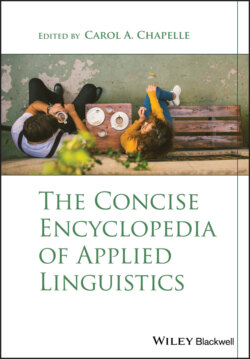Читать книгу The Concise Encyclopedia of Applied Linguistics - Carol A. Chapelle - Страница 185
Conclusion
ОглавлениеThis entry has presented a concise overview of the theoretical, methodological, and empirical issues surrounding the roles of attention, noticing, and awareness in adult L2 behavior and learning and provided brief synopses of empirical studies premised on these roles in L2 development. The overall findings appear to indicate facilitative effects of attention/noticing and awareness on adult L2 learners' subsequent processing, intake, and learning of targeted L2 forms or structures embedded in the L2 data, with one caveat: Not all data attended to or noticed automatically become internalized in the internal system. At the same time, notwithstanding the methodological concerns inherent in both the operationalization and measurement of the slippery construct of awareness, further research on unaware learning is warranted given the central role awareness plays in many major strands of SLA research. While current research findings are indeed promising, more robust research designs are clearly needed to address the issue of L2 development premised on the roles of attention/noticing and (un)awareness given the wide variety of variables that can potentially impact learners' processing and processes while interacting with L2 data. Such findings can only improve our understanding of the attentional and cognitive processes involved in L2 learning.
SEE ALSO: Task‐Based Learning: Cognitive Underpinnings
